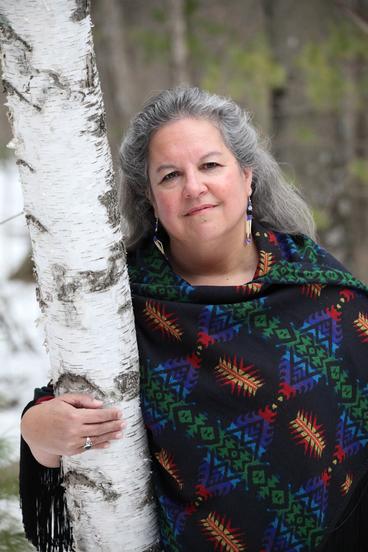While reflecting on all the engagements academic life makes possible but which the COVID-19 pandemic had deterred, he thought of one of his favorite writers, Linda Hogan, a Chickasaw novelist, essayist, and environmentalist, and questioned, “With all of the possibilities of Zoom, I wonder if Linda Hogan would be open to doing a virtual event?” He immediately sent a message to what he assumed was Hogan’s agent’s email address, inquiring if Hogan was doing virtual events during COVID-19. Twenty minutes later, Hogan herself responded, saying, “I would love to do this. Let’s talk.”

pc: Dale Kakkak
Syring didn’t want to do a one-off book reading but create a chance to engage “contemporary Indigenous thinkers to explore how Indigenous thought can be made more central to education and research. The goal is to make this inclusive of diverse perspectives and to influence thinking on a wide range of topics, from how research and education are carried out, to who benefits and participates.” His prior conversations on the Campus Research, Scholarship, and Creative Activity Committee with Dr. Jennifer Liang (Integrated Biosciences) about bringing specialists to campus and supporting scholarship had laid a rich foundation for TECIT.
The Integrated Biosciences Graduate Program Liang directs at UMD encompasses all biological sciences, from biochemistry to global warming. Having that range of focus in the same room promotes forging connections rather than dividing into specialties. Syring reflected, “One of the fundamental commentaries from Indigenous cultures and thinkers is the separation of disciplines is nonsensical, not only from a cultural perspective but from the perspective of good science, making good empirical observations. Excising all those ways of thinking means you miss things.”
After Dr. Melissa Nelson (Professor of Indigenous Sustainability at Arizona State University and member of Turtle Mountain Band Chippewa Indians) presented on February 3, 2022, Liang considered: when we write scientific papers for other scientists, we take the position we are writing from an objective point of view. There’s no acknowledgement we’re also telling a story, or when we make tables and figures, we’re considering the aesthetic beauty of those. They’re supposed to be objective. But the reality is we are telling a story and want them to be beautiful.
Liang asserts, “Scientists are worried we’re not doing a good job of communicating the importance of our work to people in our community, so this project is a good opportunity for us to learn how to do that better.”
Peter Murdock Levin, ABD (Institute on the Environment), Dr. Katy Chapman (Math, Science & Technology, UMN Crookston), and Dr. Rebecca Webster (American Indian Studies) have also shaped the events. The group received $12,000 from the Institute for Advanced Study (IAS) and another $3,000 from the Institute on the Environment (IonE). Dr. Laurie Moberg (IAS) has been instrumental in helping connect the collaborative with UMN systemwide communities.
After much planning, Transdisciplinary Engagements with Contemporary Indigenous Thinkers held its first event on
January 20, 2022 when it hosted Vern Northrup (Fond Du Lac Band of Ojibwe), artist and retired wildlands firefighter. Since then, Mohawk Nation seedkeeper Rowen White spoke, and this year’s Overman Lecture events featured Dr. Robin Kimmerer, best-selling author of Braiding Sweetgrass: Indigenous Wisdom, Scientific Knowledge and the Teachings of Plants. Dr. Kimmerer is a member of the Potawatami Indigenous nation, and a botanist. As they plan events for Fall 2022, TECIT welcomes speaker recommendations from the community, and graduate students have already made suggestions.
In addition to organizing speakers, the collaborative has set up “learning communities” so that people interested in going
beyond hearing a virtual talk may connect with others who wish to read and discuss the work of the Indigenous thinkers who present.
When considering how the project came together, Syring remarked, “It’s all improvising.” As a systemwide project, TECIT has needed to navigate different campus common times for events, but they’ve embraced and are energized by the adaptations: everything is virtual, so there’s little carbon footprint, and people from Minnesota to international locations can attend
either synchronously or asynchronously via the recording.
The group hopes this project will grow and serve as a model for other universities to imitate. When they introduce speakers at events, they have been stating: “Our collaborative grows out of the conviction that land acknowledgments without action are hollow symbols. We are taking action to invite Indigenous thinkers to share with the university community and beyond because we want to transform the work of the university to do more than acknowledge—we want the material and intellectual activities of the university to benefit and include Indigenous individuals and communities.”
